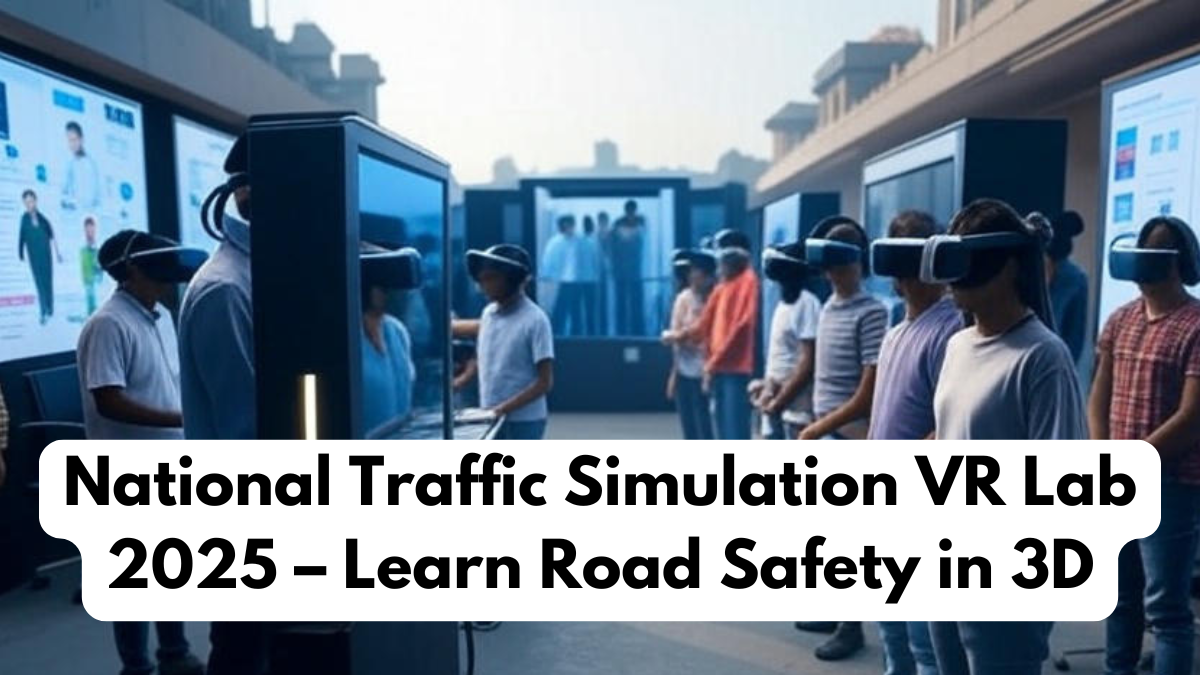The National Traffic Simulation VR Lab 2025 is revolutionizing the way people learn about road safety in India. By integrating Road Safety Training into an immersive 3D virtual reality experience, the lab offers a new approach to reducing accidents and improving driver behavior. This initiative is designed for everyone—drivers, pedestrians, school students, and even traffic enforcement officers—ensuring that safety awareness spreads across all age groups.
The lab replicates real-life driving and traffic conditions using cutting-edge VR headsets and simulators, allowing users to experience dangerous situations without any real-world risks. Participants can practice making quick decisions, understand traffic signals better, and prepare for unexpected road hazards.

How the Traffic Simulation VR Lab Works
The Traffic Simulation VR Lab uses high-fidelity 3D simulations combined with haptic feedback to create a realistic road environment. Learners sit in a simulator seat with steering controls, accelerator, and brake pedals, while a VR headset projects a 360-degree traffic scenario. This setup can replicate everything from busy city streets to rural roads and highways.
Key modules include:
-
Urban Traffic Management – Learning lane discipline, pedestrian safety, and traffic light rules
-
Highway Driving Skills – Handling overtaking, sudden braking, and merging lanes
-
Adverse Weather Conditions – Navigating in rain, fog, and low-light conditions
-
Emergency Situations – Responding to tire bursts, sudden pedestrian crossings, and vehicle breakdowns
Benefits of Road Safety Training Through VR
Unlike traditional classroom-based Road Safety Training, VR-based learning engages users through interaction and real-time decision-making. The emotional impact of experiencing a near-miss or simulated accident in VR often leaves a stronger impression, encouraging safer driving habits.
Other benefits include:
-
Safe environment for high-risk scenario practice
-
Reduced cost compared to physical training grounds
-
Customizable difficulty levels for beginners and advanced learners
-
Real-time performance feedback to identify areas of improvement
Locations and Access
The National Traffic Simulation VR Lab is being rolled out across multiple cities in India in 2025. Some labs are permanent facilities, while others are mobile VR units that visit schools, colleges, and public events.
| City | Type of Lab | Target Audience | Launch Month | Special Features |
|---|---|---|---|---|
| Delhi | Permanent Center | Drivers, Students, Traffic Police | January | Multi-language VR modules |
| Mumbai | Mobile VR Unit | School Students, New Drivers | March | Free sessions for first-time learners |
| Bengaluru | Permanent Center | Corporate Employees, Driving Schools | May | Advanced AI driving analysis |
| Jaipur | Mobile VR Unit | Rural Drivers, Youth Clubs | July | Rural road condition simulations |
This distribution ensures both urban and rural communities have access to high-quality Road Safety Training tools.
Role in Reducing Road Accidents
Road accidents in India claim thousands of lives every year, often due to poor driving practices and lack of awareness. The Traffic Simulation VR Lab directly addresses these issues by allowing drivers to experience the consequences of risky behavior in a virtual setting. This method is expected to significantly reduce accident rates, especially among young and inexperienced drivers.
By training in a no-risk environment, participants can make mistakes, learn from them, and develop better reflexes without endangering lives or property.
Conclusion
The National Traffic Simulation VR Lab 2025 is a milestone in India’s road safety initiatives. By merging technology with Road Safety Training, it provides an impactful, cost-effective, and widely accessible way to educate people about safe driving practices. With its expansion to multiple regions and mobile outreach programs, this VR-based approach has the potential to create a generation of more responsible road users, ultimately saving countless lives.
FAQ
Who can use the Traffic Simulation VR Lab?
The lab is open to drivers, students, traffic police, and anyone interested in learning about road safety.
Is there a fee for participating in the VR training?
In most cities, the training is free for students and first-time drivers, while others may have a nominal fee.
Can the VR lab simulate rural and off-road conditions?
Yes, it includes scenarios for rural roads, highways, and city environments.
How long does a training session last?
Sessions typically last 30–45 minutes, including performance feedback.
Will the VR lab expand to smaller towns?
Yes, mobile VR units are planned to cover smaller towns and rural regions throughout the year.
Click here to learn more